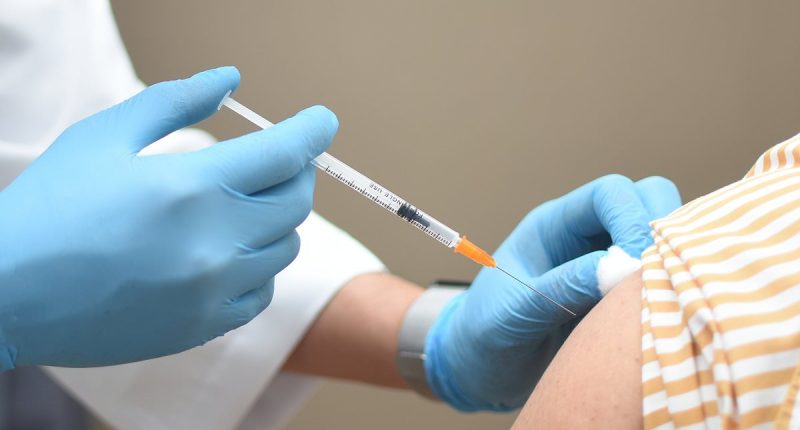Share this @internewscast.com
Almost three quarters of teens in some parts of England are missing out on a crucial anti-cancer vaccine, health officials warned today.
The jab is offered to children aged 12 to 13 to protect them against human papillomavirus.
Infection with the virus—also known as HPV—can trigger several types of cancers, including those in the head, neck and cervix.
HPV is commonly spread through vaginal, anal and oral sex with someone who is already infected, with around a third of people infected at any one time.
While a highly HPV effective vaccine has been offered to all girls in Year 8 since 2008, and all boys since 2019, latest data shows as few as a third of children in some areas of England are not getting it—leaving them vulnerable in later life.
Experts have now urged parents to ensure their child gets the vaccine, labelling it ‘one of the most powerful tools we have for cancer prevention’.
It comes amid a documented rise in head and neck cancers, particularly among younger and middle-aged patients, which has been linked to HPV spreading via oral sex.
Research has suggested that HPV may be responsible for up to 70 per cent of head and neck cancers.

Just 67.2 per cent of girls were fully vaccinated in 2021/22, down from a high of 86.7 per cent in 2013/14. Some 62.4 per cent of boys, who have been offered the jab on the NHS since 2019, were jabbed in the most recent school year, NHS data shows
The virus is also responsible for almost all (99.7 per cent) of all cases of cervical cancer, a form of the disease that develops in a women’s cervix.
Nationally, more than one in four young people eligible for the jab haven’t taken up the jab, according to data for the 2023 to 2024 academic year.
But, analysis shows that uptake is far lower in certain parts of the nation.
The borough of Brent in north-west London recorded the lowest HPV uptake of any local area, with only one in four girls in Year 9—aged 13 or 14—having had the jab.
It was the affluent borough of Kensington and Chelsea, however, which recorded the lowest uptake for boys in Year 9—with just 25.8 per cent taking up the vaccine.
Meanwhile, among Year 10 students—aged 14 or 15—vaccination levels in girls ranged from 38.7 per cent (Lambeth in London) to 97.6 per cent (Northumberland).
Among boys, it ranged from 28.2 per cent (Lambeth in London) to 92.2 per cent (West Berkshire).
Dr Sharif Ismail, consultant epidemiologist at UK Health Security Agency (UKHSA), said: ‘The HPV vaccine, now just a single dose offered in schools, is one of the most powerful tools we have for cancer prevention.

Cervical cancer symptoms to look out for include unusual vaginal bleeding, pain during sex and lower back or pelvic pain
‘Every vaccination represents a young person with better protection against the devastating impact of HPV-related cancers, and we must do more to ensure that no teenage girl or boy, young woman or man is denied that protection no matter where they live.
‘We’re calling on all parents to return their children’s HPV vaccination consent forms promptly.
‘This simple action could protect your child from developing cancer in the future.’
Dr Ismail said any young adult up to age 25 who missed their school jab can also speak to their GP about catch-up options.
He also urged women to still attend cervical screening to ensure they are being checked for changes that could lead to cervical cancer.
Cancer Research UK chief executive Michelle Mitchell added: ‘Thanks to the power of research and the efforts of NHS staff, a future where almost nobody gets cervical cancer is in sight.
‘This progress hinges on people’s access to two life-saving offers—HPV vaccination and screening. Together, they give the best protection against the disease.
‘Beating cervical cancer means beating it for everyone, so I encourage all parents and guardians to ensure young people don’t miss out on getting the HPV vaccine.

This data shows that in the UK cases of throat cancer have been trending upward, just like in the US (source: Cancer Research UK)

Mouth ulcers that don’t heal, a hoarse voice and unexplained lumps in the mouth are all warning signs of the disease
‘And if you receive your cervical screening invite, don’t ignore it.’
Dr Amanda Doyle, national director for primary care and community services at NHS England, said: ‘The NHS HPV vaccination programme has already helped save thousands of lives and we need to go further to boost uptake of HPV vaccines and cervical screening to help eliminate cervical cancer in England by 2040.
‘If we can ensure that almost every Year 10 girl in some areas is protected and extremely unlikely to ever develop cervical cancer, we need to match this in every part of the country.’
Roughly two women in Britain every day die from cervical cancer, which famously killed TV personality Jade Goody at the age of just 27.
The disease is often called a ‘silent killer’ because its symptoms can be easily mistaken for less serious problems, such as heavy periods and exhaustion.
But if the signs are recognised early, the chance of surviving for at least five years is roughly 95 per cent.
This drops to 15 per cent if the cancer is detected at later stages, when it has spread to other areas of the body.
Children are offered the HPV jab in early adolescence because it is considered to be most effective if given before someone becomes sexually active.

NHS cervical screening data, which goes back to 2011, shows uptake was at its highest that year (75.7 per cent) and has fallen over time
UKHSA highlighted the low rates of HPV vaccine uptake as part of Cervical Cancer Screening Awareness week.
Currently women aged 25 to 49 in the UK are invited for a cervical screening check at their GP surgery every five years.
They were previously offered screening every three years, but this was recently changed after the longer time period was found to be just as effective.
For those aged between 50 and 64, it is offered every five years.
Screening is arguably all the more important for women aged 34 and above, who did not receive a vaccine that protects against the vast majority of cervical cancers as part of the school programme introduced in 2008.
Depending on the result of the smear test, some women may be recalled earlier than the three-year routine intervals.
But screening uptake overall remains low. Only around 70 per cent of eligible women, roughly 4.6million, turn up for their scheduled test.
Embarrassment is a factor, according to research by cervical cancer charities.
For half of the 1.3 million no-shows every year, getting time off work and finding a convenient time to fit in an appointment are the other reasons they miss it.
















